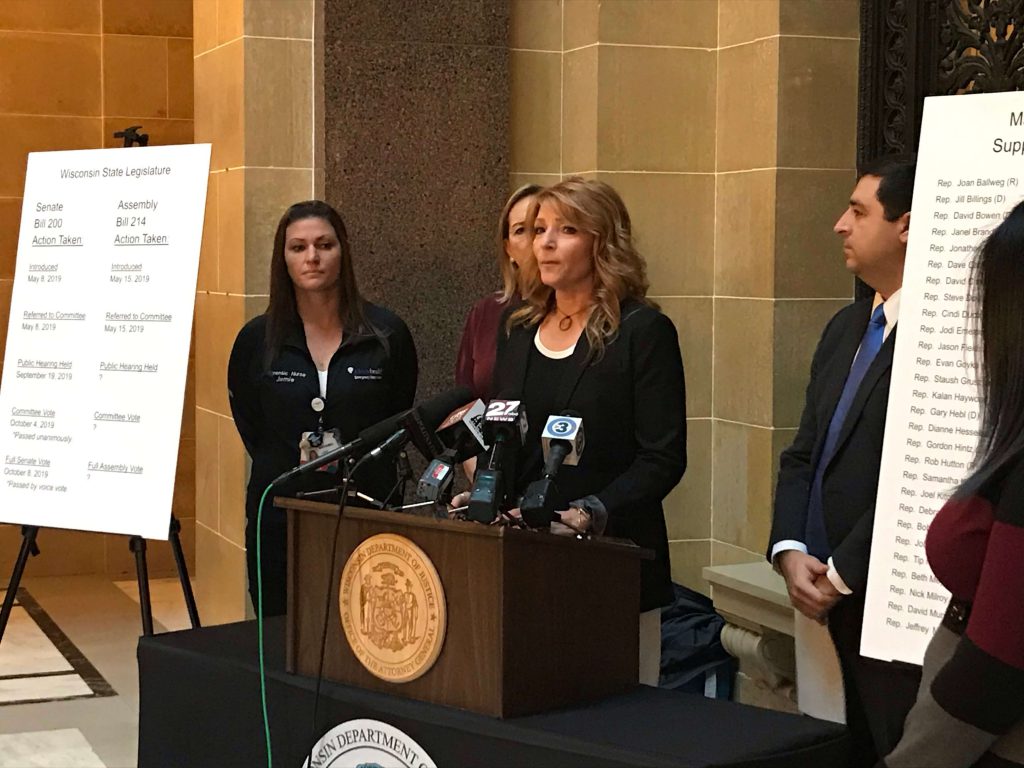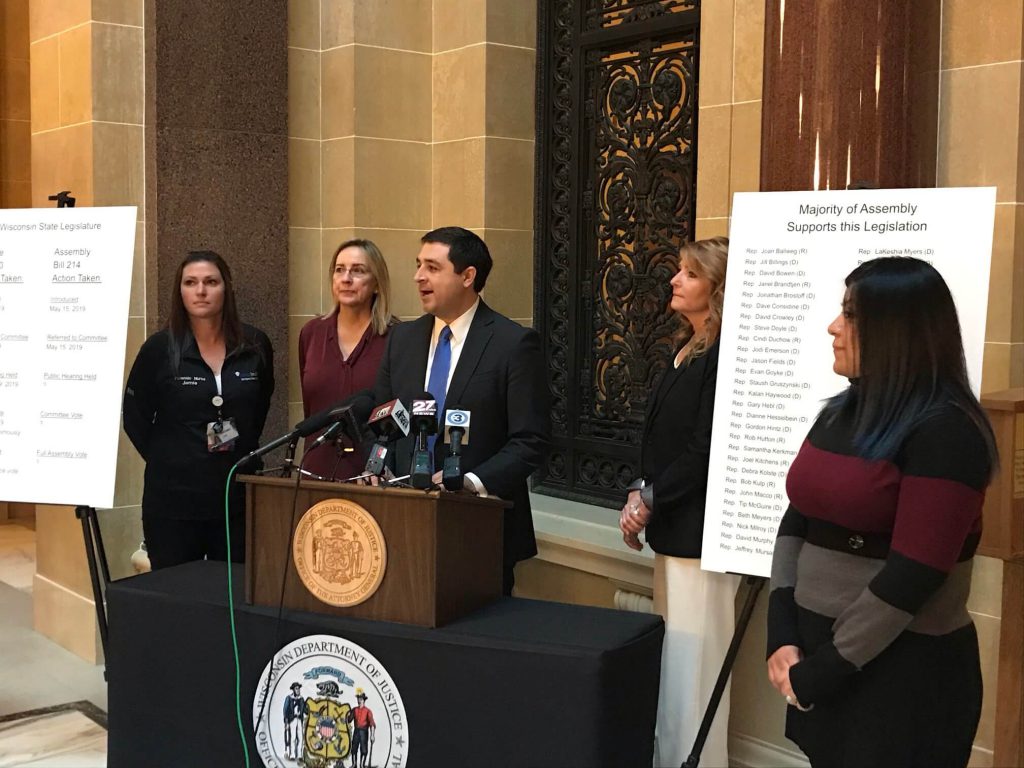Kaul Pushes Assembly for Rape Kit Bill
AG wants legislation to ensure no more backlog of untested sexual assault kits.

Jacqueline Jaske, a sexual assault survivor, shares her story at a Capitol news conference with AG Josh Kaul. Photo from the WI DOJ.
Among the top issues during the campaign for attorney general of Wisconsin last year was the backlog of untested sexual-assault kits — physical evidence taken from victims after an assault to secure potential DNA criminal evidence.
That issue is back in the news this week, as a serial sexual offender, Leroy R. Whittenberger became the first assailant convicted and sentenced as a result of a backlog of sexual-assault kits being tested in Wisconsin. He assaulted a teenage victim in 2012 and the victim’s kit went untested for five years. The eventual 2017 test led to Whittenberger, who had three prior sexual assault convictions in other counties, being sentenced in Waupaca Circuit Court to 25 years in prison plus extended supervision for three counts of second degree sexual assault.
On Tuesday, Attorney General Josh Kaul launched an all-out push to make sure victims don’t have to wait so long for justice while perpetrators may be free, with two news conferences aimed at pressuring the chair of the Assembly Committee on Health Rep. Joe Sanfelippo (R-New Berlin) to “immediately” hold a public hearing on bipartisan legislation that would prevent a future backlog of untested sexual assault kits — often called “rape kits” — by establishing testing timelines and protocol.
A query to Sanfelippo and his staff on whether he plans to hold a hearing and a vote was not returned by publication time. (Any response will be updated here.)
Kaul, who has a reputation in state government for his even-keeled approach, is not pulling punches on this issue. The location of Kaul’s morning Capitol news conference was just steps away from Sanfelippo’s office. Tuesday afternoon, Kaul held another news conference in Sanfelippo’s home district at West Allis City Hall, joined by West Allis Mayor Dan Devine, as well as a police officer and a sexual assault nurse examiner.
Speaking at both events with Kaul was Jacqueline Jaske, a survivor who was raped 25 years ago after a man followed her and her five-year-old son home from a grocery store in West Allis, assaulted her and told her young child that if he screamed he would kill his mother. She now volunteers helping train those who work with sexual assault victims. She spoke to the “humilation of a rape kit” being awful for a survivor to endure. However, she went to the hospital to secure DNA evidence that ended up being critical in convicting her assailant.
“We are mothers, daughters, sisters, grandchildren, friends left on the shelf for someone else to deny justice, and closure,” said Jaske. “This is not a race issue. This is not a gender issue. This is not a religious issue. This should not be an issue.”
Jaske concluded: “This wrong needs to be made right. Don’t waste any more time.”
AB 214 ground to a halt in the Assembly
Since its introduction in May 2019 by bipartisan co-authors Sen. Robert Cowles (R-Green Bay), Sen. Patty Schachtner (D-Somerset), Rep. Melissa Sargent (D-Madison) and Rep. David Steffen (R-Green Bay), there has been no opposition expressed to the bill Kaul wants passed.
The bill, AB 214, enjoys broad bipartisan legislative and community support. A total of 71 representatives and senators are co-sponsoring the bill, including 25 Republicans, 46 Democrats and a majority of members of the Assembly. The bill’s Senate counterpart (SB-200) passed the state Senate on Oct. 8 and was sent to the Assembly where it is stalled in the health committee. In November, Speaker Robin Vos declared the Assembly had adjourned until January.
Support for the bill has been registered by the Wisconsin Chiefs of Police Association, Wisconsin Nurses Association and the Wisconsin Coalition Against Sexual Assault, among others. No groups have registered against it.
The lack of opposition, and the urgency of the issue, were reasons why Kaul said he held the news conferences, which targeted assembly health committee chair Sanfelippo.
“That’s why we were here today, calling on Rep. Joe Sanfelippo to schedule a public hearing,” said Kaul, “I’m hoping that Rep. Sanfelippo will do the right thing and schedule a hearing on this and that we’ll have a vote scheduled in the health committee as soon as possible.”
Establishing a process

Attorney General Josh Kaul advocates for a law to prevent another backlog of untested sexual-assault kits at a Capitol news conference on Dec. 3 2019. Photo from the WI DOJ.
Under the bill when a health-care professional collects potential sexual-assault evidence from a victim, that person may choose whether to report the assault to law enforcement or not. If they choose not to report the incident, the kit would go within three days to the state crime lab for storage.
According to the bill text: “This bill creates procedures for transmission, processing and storage of sexual assault kits.”
Currently there is no state law regarding collecting and processing of sexual-assault kits, which Kaul wants to change “immediately,” saying the lack of any requirement allowed thousands of kits to go untested for many years under previous attorneys general, particularly his predecessor Brad Schimel.
Under Schimel, a backlog of 6,000 kits (reportedly 2,000 from children) sat untested in storage rooms at hospitals and police stations. This generated outrage, and Schimel’s political detractors (not including Kaul), began referring to him by a moniker that stuck: “Backlog Brad.”
If the popular bill that Kaul is pushing were signed into law, it would establish procedures that would prevent future backlogs.
Under the bill, when a health care professional collects sexual assault evidence, a victim will have the choice whether to report the assault to law enforcement or not. If the victim chooses not to file a report with law enforcement, the health care professional will send the kit to the state crime laboratories for storage within 72 hours where it will be stored up to 10 years and can be used if the sexual assault survivor changes his or her mind about reporting.
If the victim wants the incident reported to law enforcement, the procedure would be that the health-care professional notifies law enforcement within 24 hours of collecting the evidence kit. Law enforcement then has 72 hours to collect the kit and 14 days to send it to state crime labs.
“One out of every six American women in her lifetime is a victim of attempted or completed rape,” said Republican co-author Steffen in his testimony supporting his bill in senate committee. “We need to ensure that all sexual assault kits are processed in the future. We owe it to sexual assault survivors and their families to ensure that local law enforcement and hospitals submit sexual assault kits to the state crime lab quickly in order to fully integrate them into the Department of Justice’s (DOJ) testing process and avoid any unnecessary delays. Every single assault kit that is untested represents a human being who went through an awful trauma, and they deserve to have their case fully investigated.”
Reprinted with permission of Wisconsin Examiner.
Legislation Link - Urban Milwaukee members see direct links to legislation mentioned in this article. Join today


















